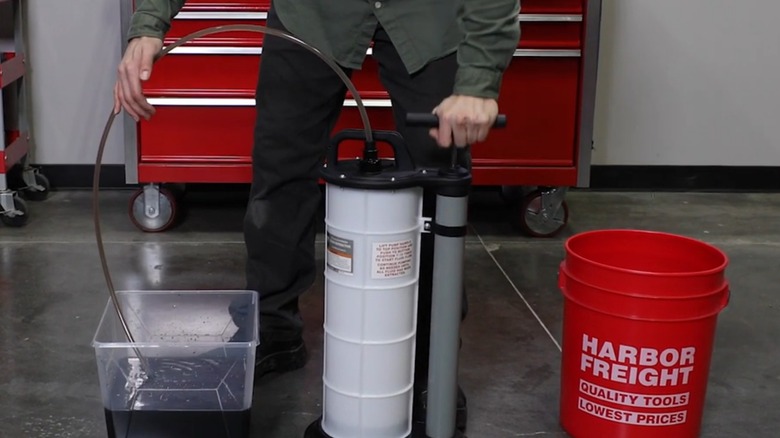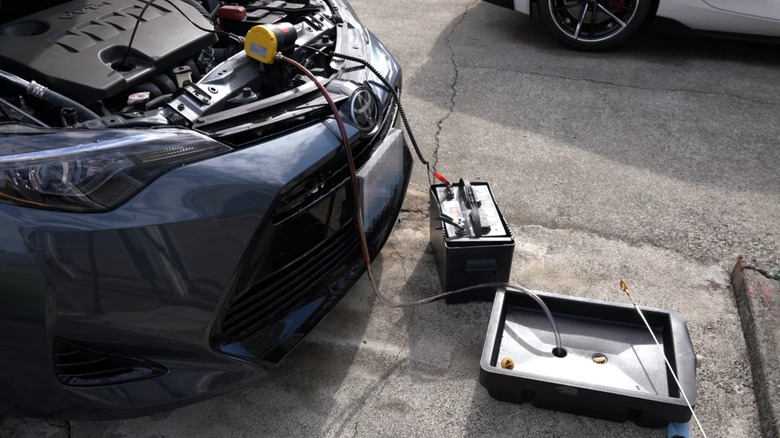What Exactly Is An Oil Extractor & How Well Does One Work?
The world of tools is populated by a vast and incredibly diverse group of gadgets and devices. From basic hand tools, like screwdrivers, pliers, and ratchets, to more advanced tools like impact wrenches and nail guns, there is a virtually unlimited number of different types of tools with a huge collection of diverse applications. Auto repair, in particular, requires the use of numerous different tools and gadgets to accomplish everything from a standard oil change to complex tasks like engine rebuilds. While many of the tools used for auto repair and maintenance are easily recognizable and commonly known, others, like oil extractors, may be unfamiliar to some DIYers and automotive novices.
Oil extractors are pumps designed to help you remove oil, or another type of liquid, from a vehicle or any container without going through the steps to drain the fluid. For example, you can use an oil extractor to replace your car's oil if you don't have access to the necessary tools. Instead of lifting the vehicle off the ground, removing the oil drain plug with a ratchet or wrench, and using a drain pan to catch the old oil that spills out, you can use an oil extractor to pump the used oil out of the engine.
However, oil extractors aren't just useful for DIY oil changes. In reality, they have numerous applications, and they can be extremely handy to have while performing maintenance and repairs. If you're interested in learning more about the kinds of jobs you can perform with an oil extractor, as well as whether or not they actually work well, stick around. Here's what you need to know about oil extractors.
What kinds of tasks can you perform with an oil extractor, and how do you use one?
Oil or fluid extractors are pumps designed to remove fluid from a container or vehicle without having to drain the reservoir from below. They're useful for sucking old oil out of an engine if you're unable to drain the oil from underneath the car. However, that's not the only job you can perform with a fluid extractor.
In the automotive world, oil extractors are commonly used for things like fluid evacuation when you can't access the drain plug, or you don't want to send the fluid through the system. For example, if you accidentally pour the wrong type of liquid into your vehicle's brake fluid reservoir, you should avoid running the engine to prevent the incorrect fluid from contaminating the rest of the brake system. An oil extractor allows you to suck the old fluid out of the reservoir instead of bleeding it out through the system. The same can apply to things like the power steering fluid reservoir. You also don't have to use oil extractors only in situations where you add the incorrect fluid, either. Removing old fluid from things like the brake fluid reservoir and power steering fluid reservoir can be tedious and messy, even in a professional shop. Using a fluid extractor allows you to remove the bulk of old fluid, without having to deal with power steering lines or brake bleeder screws.
Using an oil extractor is pretty straightforward. Depending on the type of device you own, you simply have to insert the hose into your fluid reservoir and begin pumping. The pump will draw fluid up the hose and into its own storage reservoir, which you can then transfer to another container for proper disposal.
Do oil extractors work well?
Generally speaking, oil extractors can work very well, depending on the task. While the best way to replace your oil is to drain it from below, as it allows debris and grime to drain out with the old oil, oil extractors can work well in a pinch if you're unable to lift the vehicle off the ground. However, a lot depends on the quality of the extractor you purchase and the type of work you're performing, too.
These devices can come in various styles and sizes, and they can be powered by everything from your own strength in the case of a manual pump to electricity, battery, and air power. Depending on what you're planning to do with the tool, the necessary power levels and storage capacity will differ. For small jobs, like sucking old liquid out of a brake fluid reservoir, you don't need much power or a large reservoir to catch the old liquid — in fact, many DIYers use simple turkey basters for this task. On the other hand, if you're evacuating a differential, you will need an extractor capable of sucking up heavy gear oil.
Overall, you can usually expect an oil extractor to work well, depending on the task you use it for, as well as the tool's quality and design. You can't really blame a cheap hand pump for underperforming if you're trying to evacuate an extremely thick liquid, like gear oil. So, it's always wise to understand your needs and research tools thoroughly before making a purchase.


